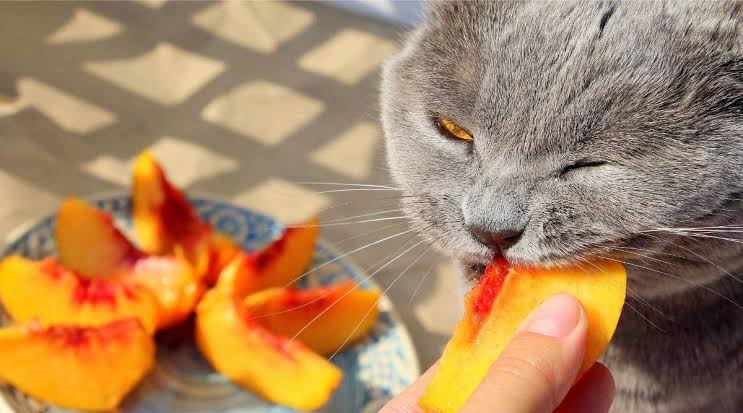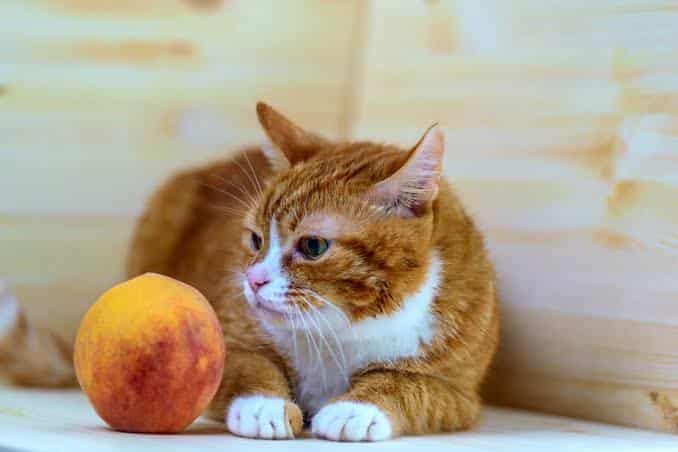A lot of questions comes up regarding Cat diet. But one that often arises is “Can Cats Eat Peaches?”. While these juicy fruits are a summertime favorite for many, it’s crucial to consider their compatibility with our feline companions’ digestive systems. We will figure that out in this article.
Unique Dietary Requirements Of Cats
Unlike omnivores or herbivores, cats are obligate carnivores, meaning their diet primarily consists of meat. This evolutionary adaptation has shaped their nutritional needs in distinct ways, making it crucial for cat owners to provide them with a diet rich in animal-based proteins, fats, and other essential nutrients. But do cats eat peaches?
Protein Requirements
Proteins are the building blocks of a cat’s diet, playing a crucial role in maintaining muscle mass, supporting growth and development, and fueling various metabolic processes. Unlike humans and some other animals, cats have a higher requirement for specific amino acids, such as taurine and arginine, which are found primarily in animal tissues. Therefore, a diet lacking in high-quality animal protein can lead to severe health issues in cats, including muscle wasting, weakness, and even heart disease.
Fat Content
Fat is another essential component of a cat’s diet, providing them with a concentrated source of energy and essential fatty acids. Fats play a vital role in maintaining healthy skin and coat, supporting brain function, and aiding in the absorption of fat-soluble vitamins.
While cats require a moderate amount of fat in their diet, it’s important to ensure that the source is high-quality and easily digestible. Avoiding excessive amounts of unhealthy fats, such as those found in processed foods or certain plant oils, is crucial for maintaining optimal feline health.
Taurine And Other Nutrients
Taurine is an amino acid that is essential for cats’ heart health, vision, and reproductive function. Unlike many other animals, cats cannot synthesize taurine in sufficient quantities and must obtain it from their diet. Therefore, it’s essential to feed cats a diet that includes sources of taurine, such as meat, fish, and poultry.
In addition to taurine, cats also require other nutrients, including vitamins, minerals, and trace elements, to support their overall health and well-being. These nutrients play critical roles in various physiological functions, including immune function, bone health, and energy metabolism.
Water Intake
Cats have a relatively low thirst drive compared to other animals, which can make them prone to dehydration, especially if they are fed a dry diet. Since cats evolved from desert-dwelling ancestors, they have a limited ability to concentrate their urine, making them dependent on obtaining moisture from their food.
Therefore, it’s essential to provide cats with access to fresh, clean water at all times and consider incorporating wet or canned food into their diet to help ensure adequate hydration.
Recommended: Can Cats Eat Bananas?

Nutritional Profile And Health Benefits Of Peaches
Peaches are not only a delicious summer treat for us humans but also a potential source of nutrition for our feline friends. Before exploring whether cats can safely enjoy peaches, let’s delve into the nutritional profile and health benefits of this juicy fruit.
Nutritional Composition
Peaches are low in calories and fat, making them a guilt-free snack option for those watching their waistline. Also, Peaches contain vitamins and minerals, including:
- Vitamin C: Known for its antioxidant properties, vitamin C helps boost the immune system and promote healthy skin and coat.
- Vitamin A: Important for vision health, vitamin A also supports immune function and reproductive health.
- Potassium: An essential electrolyte, potassium helps regulate blood pressure and maintain proper muscle function.
- Fiber: Peaches contain dietary fiber, which aids in digestion and helps prevent constipation.
Antioxidant Properties
Peaches are packed with antioxidants, including flavonoids and phenolic compounds, which help protect cells from damage caused by free radicals. These antioxidants have been linked to a reduced risk of chronic diseases, such as heart disease, cancer, and diabetes, in humans. While research on the specific benefits of antioxidants for cats is limited, it’s possible that they may offer similar protective effects for our feline companions.
Hydration And Digestive Health
Peaches have a high water content, making them a hydrating snack option for both humans and cats. Adequate hydration is essential for maintaining kidney health and supporting proper urinary function in cats. Additionally, the fiber found in peaches can help promote healthy digestion and prevent issues like constipation in felines.
Factors To Consider When Introducing Peaches To A Cat’s Diet
Introducing new foods into your cat’s diet requires careful consideration to ensure their health and well-being. When it comes to peaches, there are several factors to keep in mind to safely incorporate them into your feline companion’s meals.
Allergies and Sensitivities
Before offering peaches to your cat, it’s essential to consider any potential allergies or sensitivities they may have. While allergies to peaches are relatively rare in cats, some individuals may experience adverse reactions, such as itching, gastrointestinal upset, or difficulty breathing, after consuming this fruit. Monitor your cat closely for any signs of allergic reactions or sensitivities when introducing peaches into their diet.
Moderation
Like any new food, peaches should be introduced to your cat’s diet gradually and in moderation. Start by offering small amounts of mashed or pureed peach as a treat or topping for their regular meals. Monitor your cat’s response and adjust the amount accordingly. Too much peach can upset your cat’s stomach or lead to digestive issues, so it’s essential to practice portion control.
Preparation
When offering peaches to your cat, it’s crucial to prepare them properly to ensure they are safe for consumption. Remove the pits, stems, and any leaves from the peach, as these parts contain cyanide compounds that can be toxic to cats if ingested. Wash the peach thoroughly to remove any pesticides or residues before feeding it to your cat.
Supervision
Always supervise your cat when introducing new foods into their diet, including peaches. Watch for any signs of choking, difficulty swallowing, or gastrointestinal upset after consuming the fruit. If your cat shows any adverse reactions or discomfort, discontinue feeding them peaches and consult with your veterinarian for further guidance.
Recommended: Can Cats Eat Cherries?
Risks Associated With Feeding Peaches To Cat
While peaches may seem like a tasty and nutritious treat for cats, there are several risks associated with feeding this fruit to our feline friends. Understanding these risks is crucial for ensuring the health and safety of your cat.
Cyanide Poisoning:
One of the most significant risks associated with feeding peaches to cats is the presence of cyanide compounds in the pits, stems, and leaves of the fruit. Cyanide is a toxic substance that can cause serious health issues if ingested by cats. Symptoms of cyanide poisoning in cats may include difficulty breathing, dilated pupils, seizures, and even death. Therefore, it’s essential to remove all parts of the peach that contain cyanide before offering it to your cat.
Gastrointestinal Upset:
Feeding peaches to cats in excessive amounts or without proper preparation can also lead to gastrointestinal upset. The natural sugars and fiber found in peaches can be difficult for some cats to digest, leading to issues like diarrhea, vomiting, or abdominal discomfort. Additionally, the acidity of peaches may exacerbate gastrointestinal issues in cats with sensitive stomachs or underlying digestive conditions.
Allergic Reactions:
While rare, some cats may experience allergic reactions or sensitivities to peaches. Symptoms of allergic reactions in cats may include itching, redness, swelling, or hives. In severe cases, allergic reactions can lead to anaphylaxis, a life-threatening condition that requires immediate veterinary attention. If you suspect that your cat is allergic to peaches, discontinue feeding them the fruit and consult with your veterinarian for further guidance.
Obesity And Weight Gain:
Like any high-sugar treat, feeding peaches to cats in excessive amounts can contribute to obesity and weight gain. Obesity is a significant health issue in cats and can lead to various health problems, including diabetes, arthritis, and heart disease. Therefore, it’s essential to practice portion control and moderation when offering peaches to your cat and to consider their overall calorie intake from all sources.
Recommended: Can Cats Eat Apples?

Steps To Take If Your Cat Consumes Peaches
Assess The Situation
Start by assessing how much of the peach your cat has consumed and whether they have ingested any parts that may contain cyanide, such as the pits, stems, or leaves. This information will help you determine the potential severity of the situation and what steps need to be taken next.
Remove Any Remaining Peach
If your cat has not consumed the entire peach, remove any remaining pieces from their reach to prevent further ingestion. Pay close attention to ensure they do not consume any parts of the peach that may contain cyanide, such as the pits or stems.
Monitor For Symptoms
Keep a close eye on your cat for any signs of cyanide poisoning or gastrointestinal upset. Symptoms of cyanide poisoning may include difficulty breathing, dilated pupils, seizures, and weakness. Gastrointestinal symptoms may include vomiting, diarrhea, abdominal discomfort, and decreased appetite.
Contact Your Veterinarian
If you suspect that your cat has ingested peaches or is experiencing any adverse reactions, contact your veterinarian immediately for guidance. Provide them with information about how much peach your cat consumed, whether they ingested any parts that may contain cyanide, and any symptoms they are experiencing.
Seek Veterinary Care
Depending on the severity of the situation and your cat’s symptoms, your veterinarian may recommend bringing your cat in for evaluation and treatment. Treatment for cyanide poisoning may include inducing vomiting, administering activated charcoal to absorb toxins, and providing supportive care to manage symptoms. In cases of severe poisoning, more intensive interventions may be necessary, so it’s essential to follow your veterinarian’s recommendations closely.
Prevent Future Incidents
To prevent future incidents of peach ingestion, take steps to ensure that peaches and other potentially harmful foods are kept out of your cat’s reach. Store fruits and other foods securely and dispose of any pits, stems, or other parts that may pose a risk to your cat.
Conclusion
The question “Can cats eat peaches?” has been thoroughly explored, shedding light on both the potential benefits and risks associated with feeding this fruit to our feline companions.
While peaches offer some nutritional value, including vitamins, minerals, and antioxidants, they also pose significant risks. Therefore, it’s crucial for cat owners to proceed with caution when introducing peaches into their cat’s diet.
